Review for Usagi Drop
Introduction
I first saw Usagi Drop on the UK’s only streaming anime service, Anime on Demand, just before it vanished into the obscurity of a paywall. I knew then and there that I wanted this show in my collection, even though it’s one of those niche anime that few mainstream distributors licence. Other than the fact that it is animated, and it’s Japanese, there’s nothing to mark this as typical of any anime you might have seen, none of the clichés and tropes of any anime that has come to UK shores before. It doesn’t look the sort of show that any company would release to appeal to an existing fanbase. Then Siren Visual in Australia went and licensed it, and announced a subtitle only release. I had placed my order before the echo died. That was back in February, and the show was eventually released in April. My backlog being what it is, as well as review discs taking precedence, I’ve only just now got to watch the show, in which time NISA in the US also announced a license of the show, and a deluxe release on a DVD and Blu-ray (Region A locked) combo for not much more than the Australian DVD only release. That US collection was released a few weeks ago, and it being a NISA title, has already practically sold out. I’m happy enough with my PAL discs, and I might as well let you into a secret, if I’m shelling out full whack for a show on the day of release, you can bet it’s going to rate highly.
It isn’t everyday that you go to a funeral and come home a father, but that’s exactly what happens to bachelor businessman Daikichi Kawachi. His maternal grandfather passes away, and when the family gathers to pay their last respects, Daikichi is initially amused to learn that in his twilight years, his grandfather fathered a child with his maid, and he teases his mother about his new auntie. When he meets six-year-old Rin Kaga, alone and isolated in her private grief, he’s the only one in the family that connects with her. It’s after the funeral that he learns why, that no one in the family is interested in taking care of Rin and inheriting their grandfather’s scandal. A moment of indignation at his kin changes Daikichi’s life forever, as he states that he will take care of Rin from now on. But what does a thirty year old bachelor know about raising a child? All he knows is that his life has been turned upside down, his needs are no longer his priority, and he’s got his hands full taking care of his new family. But as he gets to know Rin, he finds that she’s a strong minded, intelligent and in some matters, a surprisingly mature young girl, and he winds up learning as much from her as he has to teach.
Eleven episodes of Usagi Drop are presented across 2 discs by Siren Visual, and there are some appetising extra features as well.
Disc 1
1. The Bellflower Girl
2. Pinky Swear
3. Daikichi’s Decision
4. Letter
5. Daikichi Should Stay Daikichi
6. My Tree
Disc 2
7. Secretly Running Away From Home
8. Precious to Grandpa
9. A Typhoon Has Come!
10. Stomach Flu
11. The First Step
Picture
Usagi Drop gets a 1.78:1 anamorphic transfer, to which Siren Visual have given the native PAL treatment. It’s a clear, sharp image, with smooth animation and no issues with ghosting and judder, but as usual it does come at the expense of a 4% PAL speed up. Usagi Drop is a delightful animation, with character designs that shy away a little from the usual anime style, but more immediate is the impact of the colour palette and the way those colours are used. Usagi Drop comes across with a combination of pastel colours and a watercolour style that emphasises the gentle emotions of the story, and keeps the subtle aspects of the relationship between Daikichi and Rin in focus. It’s not a style that we are used to seeing in anime, which is usually bold and brash, but here it works a treat.
Sound
Usagi Drop is a subtitle only release, both in Australia and in the US, and the Region 4 DVD gets DD 2.0 Stereo Japanese audio with player forced translated subtitles and text captions. This is apparently a licensor stipulation, common on most noitaminA titles released in English speaking territories, and while it is an annoyance, it’s a price I am willing to pay in this case. The dialogue is clear throughout, and quite obviously it’s not an action oriented show. That said, the audio does an impressive job of immersing the viewer in the show, in terms of ambience and most especially in the show’s gentle and very appropriate music. The opening and end themes to the show in particular couldn’t be more perfect. Most anime with child characters usually cast adults in the role, mostly because of the work involved being inappropriate or excessive for child actors, while also longer running shows require actor voices not to change. A lot of young boys thus have women voicing them. That wouldn’t work at all for Usagi Drop, where realism is key to the show’s success. The children in this show are played by children, and the actress who plays Rin in particular, Aya Matsuura gives a very engaging performance.
Extras
Usagi Drop’s two discs come in an Amaray case, with the second disc held on a central hinged panel. The sleeve is reversible, with one side of the sleeve carrying the disc blurb on the back, title and logos with the artwork on the front. The other side of the sleeve has just the artwork on the front without any embellishment, and the episode list on the back. The Amaray case comes in a card slipcase with a different piece of artwork, and the massive Australian ratings logos.
Both discs come with animated menus that replay the show’s opening theme. On disc 1 the only options are an Episode Select Screen and a Play All option.
The show’s extras are all on disc 2.
As well as the main episodes, there were four short animations that added more Rin and Daikichi adventures to the story, and they are presented here on this disc. There’s about a whole episode’s worth in total, and they vary from just cute, Daikichi and Rin moments, to added story that leads off from the end of the previous episode. They’re well worth watching in the right places in the episode runs, even if it means a bit of disc swapping.
2.5. Leaf Aquarium (4½ minutes)
3.5. Dear Santa (5½ minutes)
6.5. Full Blossom in the Skies (5 minutes)
8.5. The Road Home (4½ minutes)
Also on disc 2, you’ll find 3 short promos for the show, and all four variations of the opening sequence without text. There are clean closings here as well, eleven of them. The show has different end animations for each episode, with images that reflect Rin’s growth to that point, and the key events of the episode just past, and it’s good that Siren have put all of them on this disc. That said, watching all eleven in a row probably isn’t advisable unless you don’t mind having an earworm for a few days.
Conclusion
Can I just say that the first time that I saw Usagi Drop online, it quickly became one of my favourite shows ever? Watching it at home, at my convenience, on a proper television merely cements that opinion. You will love this show, and you really ought to buy it. Note that I said show, and not anime, although it technically is the latter. In many ways however it is unlike anime that you’ll have seen, in art and animation style, in content, and in the fact that it has none of the familiar tropes and clichés of the anime that you may be familiar with. It’s a pure and simple story, with a focus on its characters, told exceptionally well. I’d recommend this show to everyone.
Japan is currently in the midst of a gerontological demographic crisis. Basically the population is skewing towards the elderly, as the young eschew relationships and having children for self-absorption and gratification. The Japanese aren’t having many kids anymore. If ever there was a series that could reverse that effect, Usagi Drop would be it, as it strongly promotes the ideas of parenthood and family, without being judgemental, or preachy. Admittedly Daikichi does manage to become a father without any of the messy stuff, and he also gets a daughter when she’s at her most cute and loveable, not yet a rebellious teen, but past potty training, yet despite that, Usagi Drop doesn’t shy away from the messy and difficult side of family life, and it doesn’t paint a rose tinted picture of parenthood.
Where Usagi Drop excels is in simultaneously offering two perspectives on family life, from the point of view of new father Daikichi, and daughter Rin. The show follows them over their first year as a family, and we watch them both grow and mature as people. Daikichi is one of those self-involved adults whose life revolves around work and free time. It’s a moment of anger at his relatives that leads to his pronouncement that he’ll take care of Rin, and it isn’t until he gets home with her that he begins to realise just what a commitment he has made. Fortunately he realises early on that the most important thing in a young child’s life is stability, and he quickly resolves to honour his commitment, but it does mean that every day becomes an education for him, as he learns the details of fatherhood, the responsibilities of being a parent. He also finds the wonder in watching a young mind develop, experiencing the way a child begins to engage with the world and explore.
We also get to see Rin grow, although when we meet her, she’s just been orphaned, which is not the typical six-year-old’s experience. She’s introverted and withdrawn, and needs Daikichi’s help to reconnect with the world and begin to trust again. It takes a while before she is comfortable with him, and even longer before she can be comfortable around other people as well. But as time passes, she blossoms into a confident and forthright girl, communicative and assertive where she was once shy. The show does an amazing job in presenting her first experiences, whether it’s going to nursery school, the way that she sees Daikichi, the way that she remembers her father, going to elementary school and making friends, learning to cook, planting a tree to mark her birth, all the way up to losing her milk teeth.
The best thing is that it isn’t all in isolation. We get to see many perspectives on parenthood, especially as at first when Daikichi is overwhelmed, he looks around for help. The first thing he does is sacrifice his relatively high flying management job for something more stable so that he can give Rin a routine, and he winds up asking his family for advice. His cousin Haruko has a young daughter and offers a little help, while his mother, initially one of the dismissive elders at the funeral, soon falls in love with Rin and comes to adore her as well. Daikichi’s sister is the way he was, eschewing relationships and motherhood for the single life, while Haruko and her daughter are very much two against the world, as Haruko’s husband concentrates on work, and her in-laws give her stress.
But at work, Daikichi meets several parents who decide that they don’t sacrifice for their children, rather they choose their children over other concerns, and have much more positive outlooks. Rin’s friend Kouki is a child of a single parent family, and Daikichi soon finds friendship and support from Kouki’s mother. He soon realises that there is a network of parents out there, and raising a child is never really a solitary activity.
Usagi Drop is as heart-warming and uplifting a series as you can possibly imagine. Its charm and attraction comes from its innocence and honesty. You really do empathise with Daikichi and Rin and this could easily have been a live action drama (indeed there is a live action Bunny Drop movie out there), but where it excels is in the way it presents its story, a gentle rollercoaster of small triumphs and little heartbreaks. You can’t help but feel for the lost and grieving Rin at the start of the show, and you can’t help but smile as Daikichi helps her come to terms with her loss and reengage with the world. There are little moments that everyone can relate to. I remember as a little boy my parents staying by my side as I was sick, just as Daikichi does for Rin here, but here you also see the sense of panic he keeps concealed as he tries to reassure her, which I now realise that my parents must also have felt. It’s utterly dispiriting when Daikichi tracks down the mother that abandoned Rin, and you see just what sort of person that she is. Then again the uplift that you get when you see Rin come to trust and rely on Daikichi totally (except when she shuns him for her stuffed toy), makes the heart swell.
I’m always looking for anime that will challenge preconceptions, will make naysayers think twice before pronouncing the medium as beneath their notice, dismissing it with a Daily Mail level of vitriol. I would have thought that Usagi Drop would be the perfect weapon in that arsenal, except that there is nothing else out there like Usagi Drop. But as television in general, Usagi Drop really needs to be seen. Just don’t be surprised if you start feeling broody after watching it though.
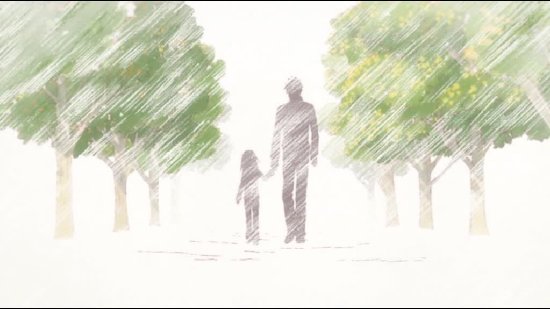
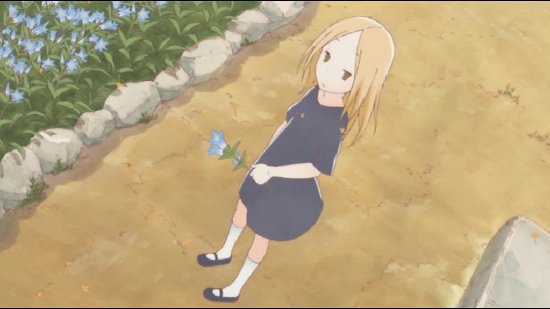
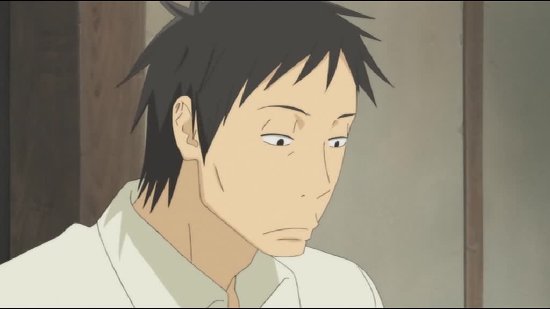
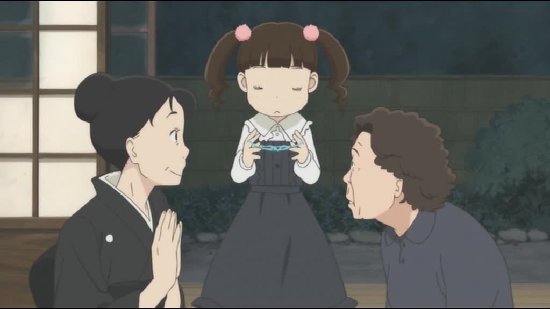
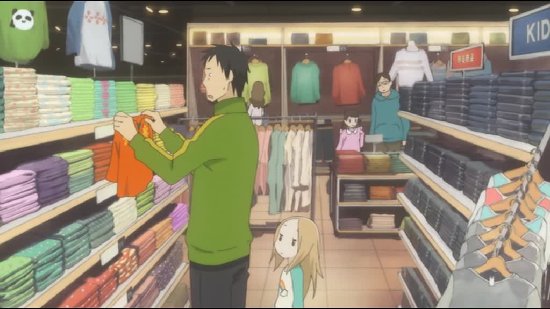
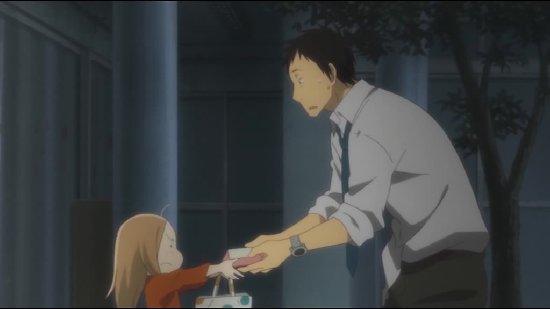
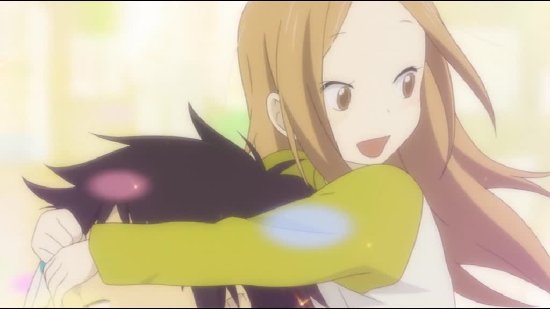
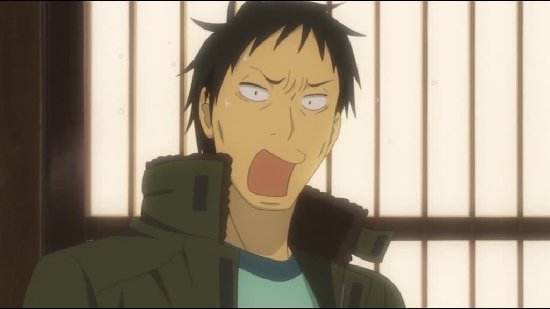
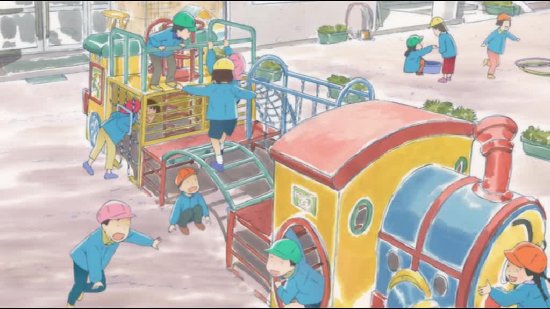
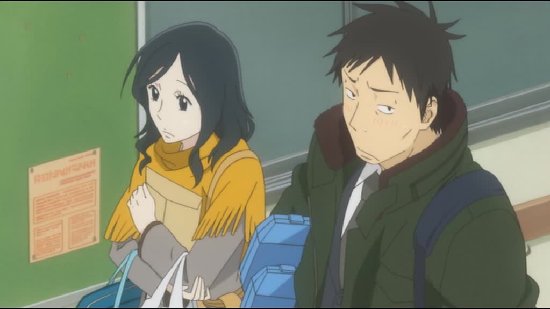
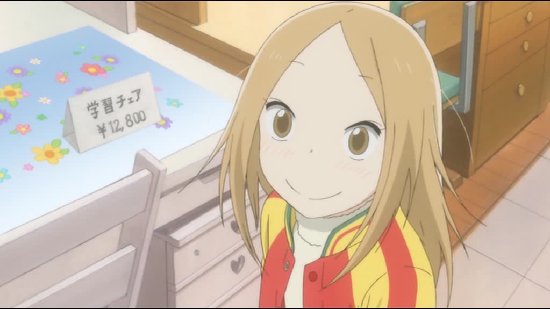
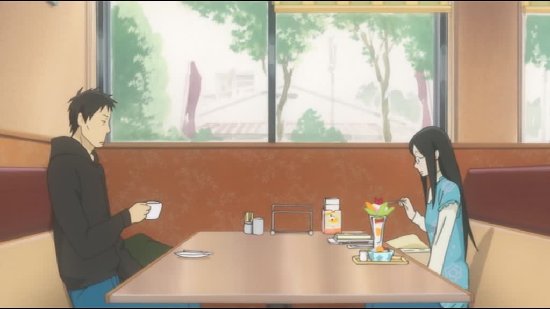
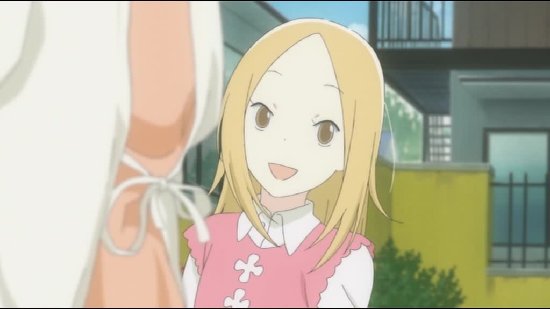
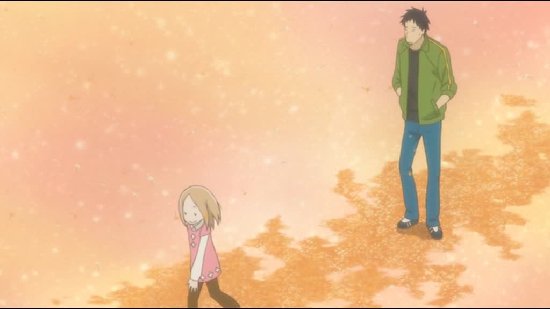
Your Opinions and Comments
Be the first to post a comment!